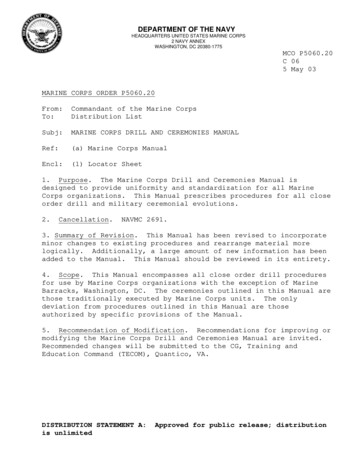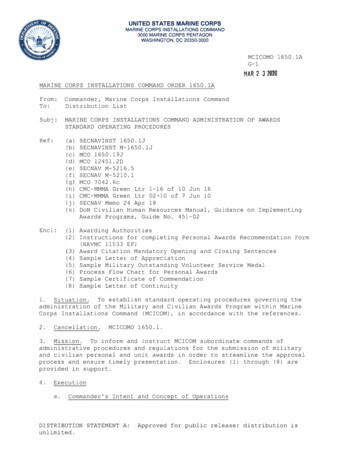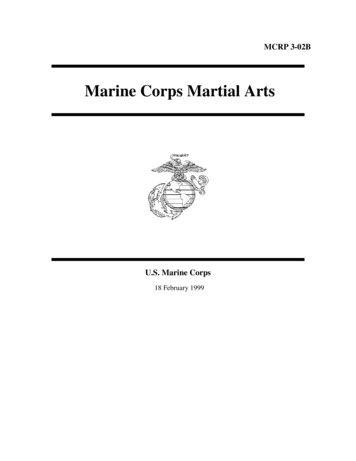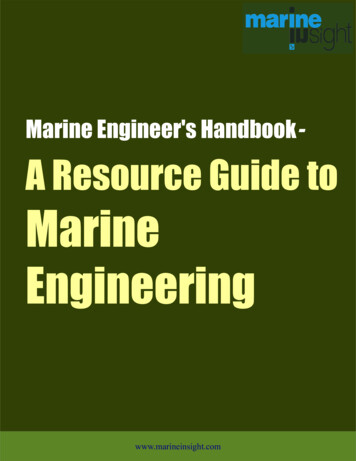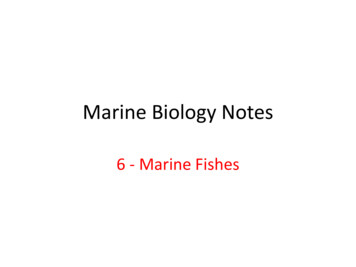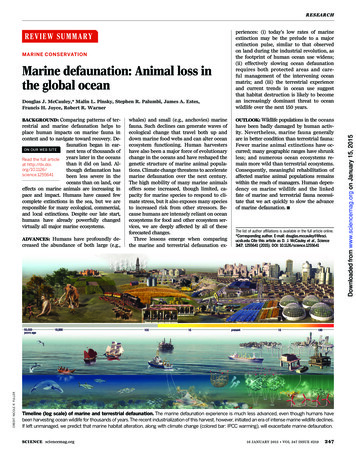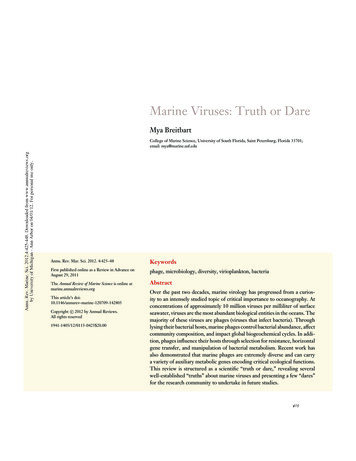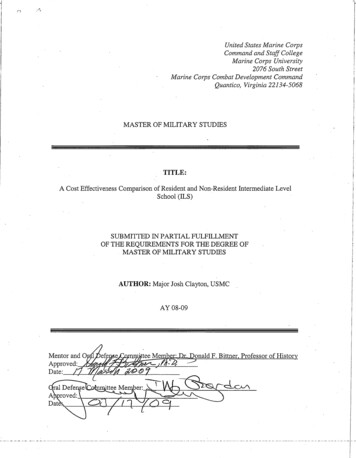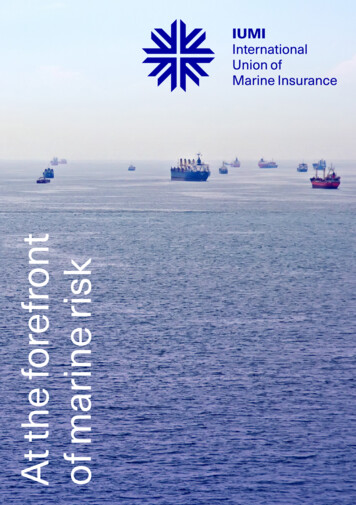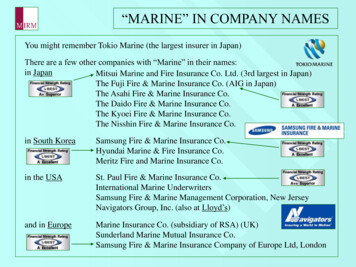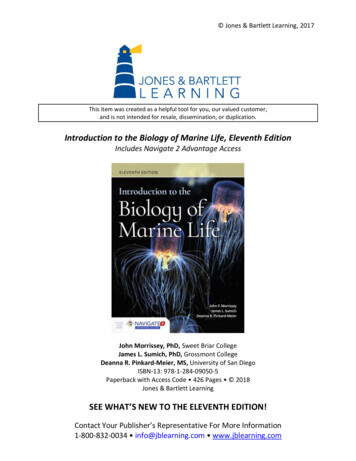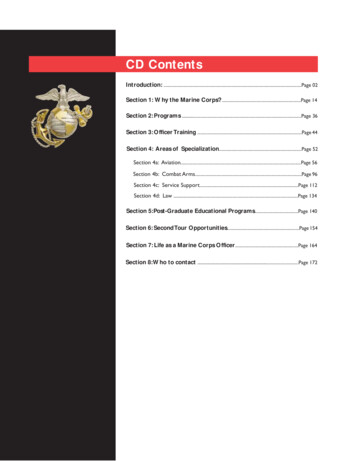
Transcription
CD ContentsIntroduction: .Page 02Section 1: Why the Marine Corps? .Page 14Section 2: Programs .Page 36Section 3: Officer Training .Page 44Section 4: Areas of Specialization.Page 52Section 4a: Aviation.Page 56Section 4b: Combat Arms.Page 96Section 4c: Service Support.Page 112Section 4d: Law .Page 134Section 5: Post-Graduate Educational Programs.Page 140Section 6: Second Tour Opportunities.Page 154Section 7: Life as a Marine Corps Officer.Page 164Section 8: Who to contact .Page 172
M ARINE O FFICERThe Change is Forever
UNITED STATES MARINE CORPS.Joining the MarineCorps meansfacing tough,real-life challengesevery day. TheMarine Corpswill develop yourcourage, poise,and selfconfidence so youcan be one of thefew, the proud,the Marines.
.the Best of the BestTo lead Marinesrequires realleadership.The Marines are the best, most elite military force in the world.To lead Marines requires a brand of leadership, a way of responding tochallenging circumstances, that can be taught only in the Marine Corps’officer programs. Your reward as a Marine Officer is knowing that you’reamong the best of the best.
WHATThe FewThe ProudThe MarinesIS THEMARINE CORPS?On November 10, 1775, the Continental Congress resolved that two battalionsof Marines be raised to serve during the war between Great Britain and theColonies. They further resolved that this force be acquainted with maritimeoperations in order to serve aboard naval vessels. Thus, the United StatesMarine Corps has always been an expeditionary naval force ready to defend thenation’s interests overseas.Our expeditionary naval capabilities are critical in a world where 70% of theworld’s countries are located within 200 miles of the coast. When crises eruptanywhere in the world, the Nation calls upon the Marine Corps to rapidly carryout foreign policy objectives. Throughout our history, the Marine Corps hasbeen the force most ready when the nation is least ready.1
What is the Marine Corps?A FORCE IN READINESSWe, as Marines, are a highly trained force ableto respond in a number of ways. The MarineCorps maintains units in the United States thatconstantly train for deployment to troublespots. They are ready and able to sail on navalships or fly on military aircraft to join MaritimePre-positioned Ships (MPS) pre-loaded withequipment and munitions. These ships can beunloaded with Marines ready to go inapproximately one week. Other Marine Corpsunits are on standby, ready to fly with theirequipment to wherever a crisis erupts, for aneven faster response.In addition to having units in the United States,the Marine Corps maintains forward deployedunits near potential trouble spots around theworld. Organized as Marine Air Ground TaskForces (MAGTFs), often as units called MarineExpeditionary Units (MEUs), Marine forces aretrained to perform missions ranging from a fullscale amphibious landing, to the evacuation ofU.S. embassy personnel, to the distribution ofhumanitarian aid. MEUs train with the Navy andoperate from naval ships, which serve as mobileplatforms able to deliver Marines to the coastof any country in the world.A Marine Expeditionary Unit is organized tocarry out a myriad of potential missions. It isnormally centered around an infantry battalion and brings its own air support inthe form of a squadron of jet aircraft and helicopters. And, since the force isdesigned to be self-supporting and able to operate for 30 days or more withoutre-supply, the MEU can operate even if cut off from outside supply lines.Leadership,self-discipline,physical fitness,and mentalreadiness makethe MarinesAmerica’s elite.2
What is the Marine Corps?TASK-ORGANIZED AVIATION, GROUND,AND SERVICE SUPPORT UNITSMarines —officer andenlisted — rise tochallenges,becoming moreinnovative whenfaced withproblems.Marine Corps units are task-organized as selfreliant teams composed of Ground CombatUnits, Aviation Combat Units, and CombatService Support Units. Ground Combat Unitscomprise approximately 30% of Marine Corpsunits and train for potential confrontation withU.S. adversaries. Ground Combat Units consistof infantry, armor, engineer, and artillery units.Aviation Combat Units consist of everythingfrom fast attack jets to troop transporthelicopters. They support the Ground CombatUnits by delivering troops and equipment tohotspots, providing deep strike capability, andproviding close air support for engaged forces.Approximately 30% of all officers are pilots. The Combat Service Support Unitscomprise the bulk of the Marine Corps and are critical to allow both theGround Combat and Aviation Combat forces to do their jobs. Combat ServiceSupport Units consist of a wide variety of specialties including communications,logistics, intelligence, finance, and supply.While only a small percentage of Marines are deployed away from home at anygiven time, all Marines constantly prepare for that possibility.THE KEY TO MARINE CORPS SUCCESS: PEOPLE AND TRAININGEveryone who joins the Marine Corps has chosen an extremely challengingroute. Knowing the Marine Corps has the most demanding training, both entrylevel and operationally, individuals like you have joined the Marine Corps andmet the standard. Marines — officer and enlisted — rise to challenges,becoming more innovative and creative when faced with problems. Each Marineis encouraged to maximize leadership potential through practice and evaluation,leading to better decisions in real-world stressful situations.3
What is the Marine Corps?We makeMarines andBUILDING A CORPS OF LEADERSThe common denominator is leadership. Marine Officers are required to beleaders and are selected based on their potential leadership qualities. Afterselection and commissioning, the Marine Corps spends approximately one yeartraining these individuals to become leaders prior to their taking charge ofenlisted Marines. Our training is tough. It has to be; Marine Officers take onresponsibility well beyond their years.As we move into the 21st century, we face a rapidly changing world withcomplex situations. Our focus must be on training people to make sounddecisions under rapidly changing conditions. The Marine Corps must beprepared for what may be called a “three-block war.” On one block we maydeliver humanitarian assistance to help people survive. Moments later, on thenext block, we may be called upon to take a harder line as a peacekeeping force.Finally, if hostilities do erupt, we must be able to win mid-intensity battles on athird block. To effectively make the right decision for the situations we face oneach block requires a sharp and agile mind, and the ability to take charge.If you are interested in being one of us — developing your self-discipline, yourdecision-making ability, and your leadership — read this book to find out moreabout opportunities as an Officer of Marines. Keep an open mind; the MarineCorps is unlike anything you have ever experienced. We offer no excuses, andwe take none. We make Marines and we win battles. No compromises.4we win battles.No compromises.
CONTENTSSECTION 1: WHY THE MARINE CORPS?This section provides an overview of the opportunities available for collegestudents and graduates interested in pursuing a career in the Marine Corps.The three major areas of opportunity are described.The Path to Becoming a Marine Corps Officer . 19EAviation . 20EGround . 21ELaw . 22Equal Opportunity . 23Marine Corps Values . 24Making Your Choice . 25SECTION 2: PROGRAMSEUndergraduate Program: Freshmen, Sophomores, and JuniorsPlatoon Leaders Class (PLC) . 29The PLC program is for undergraduate students who are interested injoining the Marine Corps Officer program while in college. This sectionprovides a description of PLC in terms of what you can expect andoutlines the qualifications.EGraduate Program: Seniors and College GraduatesOfficer Candidate Class (OCC) . 33The OCC program is for college seniors and graduates who areinterested in joining the Marine Corps Officer program. This sectionprovides a description of OCC in terms of what you can expect andoutlines the qualifications.SECTION 3: OFFICER TRAININGEOfficer Candidates School (OCS) . 35All officer candidates attend OCS. This section describes what will beexpected of candidates while at OCS and other specific informationabout the School.EThe Basic School (TBS) . 37After OCS, candidates attend The Basic School to learn the duties andresponsibilities of a Marine Corps Officer.5
CONTENTSSECTION 4: AREAS OF SPECIALIZATIONEach Marine performs a special job. The areas of specialization available toofficers are described in this section.Your Job in the Marine Corps . 41AviationAviation Introduction . 43Flight Training . 47F/A-18 Pilot . 51AV-8B Harrier Pilot . 53EA-6B Prowler Pilot . 55KC-130 Hercules Pilot . 57AH-IW Cobra Pilot . 59CH-53 Pilot . 61UH-IN Huey Pilot . 63CH-46 Pilot . 65Naval Flight Officer (NFO) . 67Aircraft Maintenance Officer . 69Aviation Supply Officer . 71Air Traffic Control Officer . 73Aviation Intelligence . 75Air Support Control Officer . 77Air Defense Officer . 79Combat ArmsInfantry Officer . 81Field Artillery Officer . 85Assault Amphibian Vehicle (AAV) Officer . 87Light Armored Vehicle (LAV) Officer . 89Tank Officer . 91Engineer Officer . 93Service SupportLogistics Officer . 95Ground Intelligence Officer . 97Human Source Intelligence . 99Signals Intelligence Officer . 101Military Police Officer . 103Communications Information Systems Officer . 105Public Affairs Officer . 107Financial Management Officer . 109Ground Supply Officer . 111Adjutant . 113LawJudge Advocate . 1156
CONTENTSSECTION 5: POST-GRADUATE EDUCATIONAL PROGRAMSThis section describes opportunities available to pursue advanced degreesor professional specialization while serving in the Marine Corps.Tuition Assistance . 119The Special Education Program (SEP) . 120The Advanced Degree Program (ADP) . 121Law Degree Programs . 122Montgomery G.I. Bill . 123Specialties for Advanced Degrees . 125SECTION 6: SECOND TOUR OPPORTUNITIESOpportunities to advance in your career and specialize in select areas aftercompleting the first term are described in this section.Marine Corps Security Forces Battalion . 131Marine Corps Recruit Depots . 132Force Reconnaissance . 132The Basic School . 132Officer Candidates School . 133Marine Security Guard . 133Marine Officer Instructor . 133Inspector/Instructor . 134Marine Corps Recruiting . 134HMX-1 . 134Test Pilot . 135NASA . 135Forward Air Controller . 136Staff Position . 136Advanced Education . 136Foreign Area Officer . 137Exchange Program . 137SECTION 7: LIFE AS A MARINE CORPS OFFICERThe benefits — tangible and intangible — of becoming a Marine CorpsOfficer are outlined in this section. Included are salary progression, medicaland other benefits, travel opportunities, and recreational and professionalsports.SECTION 8: WHO TO CONTACTMarine Corps Officer Selection Officers are USMC Officers whose job is totalk to college students interested in becoming Marine Corps Officers.They come from all backgrounds and represent various specialties.7
N O P ROMISESWhen troublecomes to ourcountry there willbe Marines —somewhere —who, throughhard work, havemade and keptMAKE THE CHANGEthemselves readyto do somethingN O S HORTCUTS8useful about it,and do it at once.
Marine Corps Core ValuesGeneration after generation of American men and women have given specialmeaning to the title United States Marine. These same men and women live by aset of enduring Core Values which forms the bedrock of their character. The CoreValues give Marines strength and regulate their behavior; they bond the MarineCorps into a total force that can meet any challenge.HONORHonor guides Marines to exemplify the ultimate in ethical and moralbehavior: never lie, cheat, or steal; abide by an uncompromising code ofintegrity; respect human dignity; and respect others. The qualities of maturity,dedication, trust, and dependability commit Marines to act responsibly; to beaccountable for their actions; to fulfill their obligations; and to hold othersaccountable for their actions.COURAGECourage is the mental, moral, and physical strength ingrained in Marines. Itcarries them through the challenges of combat and aids them in overcomingfear. It is the inner strength that enables a Marine to do what is right; toadhere to a higher standard of personal conduct; and to make toughdecisions under stress and pressure.COMMITMENTCommitment is the spirit of determination and dedication found in Marines.It leads to the highest order of discipline for individuals and units. It is theingredient that enables 24-hour-a-day dedication to Corps and country. Itinspires the unrelenting determination to achieve a standard of excellence inevery endeavor.As a future Marine, reaffirm these Core Values and ensure they guide yourperformance, behavior, and conduct every minute of the day.
Pride of BelongingKNOWLEDGELEADERSHIPSELF-CONFIDENCEMENTAL HALLENGETEAM-BUILDING SKILLSRESOURCEFULNESS
WHY THE MARINE CORPS?As a college undergraduate or graduate student, you maybe thinking about what you’ll do after you complete yourcourse of study. There are many options. If you areinterested in learning how to lead, shouldering enormousamounts of responsibility while developing your analyticalthinking abilities, consider becoming an Officer in theUnited States Marine Corps. You’ll find rewards, challenges,and excitement that few other careers can match.Think about what you could do with the opportunitiesavailable to Marine Corps Officers. Since the Marine Corpsdoes not have its own service academy, we look for collegeand university students who are interested in testingthemselves while developing their leadership skills.Marine Corps Officer commissioning programs (the PlatoonLeaders Class and the Officer Candidate Class) are designedto bring out the best in you by putting you through thetoughest training and evaluation you have ever faced. Thetraining forces you to search your own desire andcommitment toward becoming a Marine Corps Officer. Tosucceed, it takes someone who’s a self-starter, reliable —someone who doesn’t settle for second best, or for a jobhalf done. The charts on pages 20–22 show a typicalprogram sequence.THE TRANSFORMATION FROM STUDENTTO MARINE“Most of us joined for thechallenge and prestige,and some to prepareourselves for success inNo matter what program you enter, you will undergo initial training at OfficerCandidates School. This training will be tough — it has to be — because MarineOfficers are expected to overcome difficult challenges. There is no easy way tobecome a leader of men and women. More than your mental and physicalabilities will be tested; we want every candidate to develop the character of aMarine. By the time you finish training you will demonstrate strength ofcharacter, mind, and will.business, law, orgovernment, but we enjoyit too much to leave.”— Marine Corps Officer9
Why the Marine Corps?After completing Officer Candidates School and(if appropriate) returning to college to finish yourdegree, you will be commissioned as a SecondLieutenant. Those who already have undergraduatedegrees will begin active service and attend TheBasic School. The Basic School is where you willgain the knowledge and skills necessary to effectivelylead Marines.As you near completion of your professionalmentoring/studies at The Basic School, you will beassigned a Military Occupational Specialty (MOS)commensurate with your personal strengths and theneeds of the Marine Corps. Upon assignment to your MOS, you will thenreceive additional training in that specialty.MARINE CORPS OFFICERS MAKE A DIFFERENCEMarine Corps training makes young men and women into more than justMarine Corps Officers. It teaches you how to accept responsibility, lead withconfidence, and effectively solve problems. During your tenure as an Officerof Marines, you will continually be pushed and expected to take on moreresponsible roles — each with a larger impact on the Marine Corps. You willlearn that you have never really tested your limits. You will know that you arecapable of much more than you ever thought possible. Marine Officers areconstantly put to the test — and consistently deliver.You will be given various assignments in your career that may take you all overthe world. Ultimately, the job puts you in charge of Marines, responsible fortheir training and their welfare. It also teaches you how to lead people andmanage jobs. Some Officers leave the Marine Corps after their first tour to usetheir leadership and professional skills to succeed inother fields. Marine-trained leaders rise to the top ingovernment, law enforcement, and business, runningmajor businesses throughout the world, fromadvertising to banking; from trucking to pizza chains.It is a challenge to earn the title of Officer ofMarines, placing you in an elite group with a proudheritage. If you’re up to the challenge, there’sexcitement waiting for you.10
Why the Marine Corps?“Nothing canquite comparewith MarineCorps trainingand combatservice to stretchyour leadershipskills in bringingpeople together toaccomplish amission.”— Phillip Rooney,vice chairman of theServiceMaster Co.PRIDEFor more than 200 years, in matters of national security and defense,there has always been a need for those who set themselves apart andexcel. There has always been a need for Marines. As a leader ofMarines you will gain honor, courage, intelligence, and leadership ability.Nobody likes to fight, but someone has to know how. We have provenour ability time and time again. It is this type of challenge, tradition,and experience that will make you proud to be an Officer of Marines!11
Why the Marine Corps?Never ask yourMarines to dosomething thatCHALLENGEyou are unableAs an Officer of Marines you are given more autonomy and responsibilityat a young age than most people will see in a lifetime. You will lead andtake care of our most precious asset: young Marines. We consider thisan honor and a privilege.or unwilling toAs an Officer you are expected to “lead from the front”; that is, to neverask your Marines to do something that you are unable or unwilling to doyourself. This means that you must learn their jobs, must endure thesame hardships, and must get to know your Marines’ strengths andweaknesses. You will develop their strengths and work on eliminatingtheir weaknesses. You will be expected to accomplish your mission andtake care of your Marines; it is not enough to do one or the other. Yourtraining and discipline will give you the knowledge and wisdom gainedfrom over 220 years of excellence, to help you meet the challenge.12do yourself.
Why the Marine Corps?We make MarineCorps trainingas tough aspossible becausewe want you todemonstrate yourtrue potential.COURAGE, POISE,AND CONFIDENCETo demonstrate your true potential, we make Marine Corps training thetoughest officer training in the world. Every Marine Officer — lawyer,pilot, tanker, finance officer — must learn to be an Infantry PlatoonCommander. You will push yourself and your Marines to new levels,whatever job you do. The esprit de corps you feel with other Marines willensure that you never leave a job half done and risk letting down yourteammates. It is precisely this difficult and grueling process that developscourage, poise, and confidence.13
Why the Marine Corps?Your Marines willPHYSICAL FITNESSexpect you to setThe Marine Corps expects its Officers to lead from the front, not fromthe rear. That is why physical fitness has to be maintained at the higheststandards in our Officer Corps. It all starts at Officer Candidates School(OCS), where you will experience some of the toughest physical trainingin the world. You will stop counting the number of pull-ups, push-ups, situps, and miles you run. As you progress in the Corps you will find that allMarine Officers keep themselves in superb shape, and find it easy tomaintain this high standard by working out with friends and trainingMarines. You join the elite few who pride themselves on being in betterphysical condition than any other armed service in the world.the example andlead from thefront. For thesereasons you willbe expected tokeep yourself insuperb physicalcondition.14
Why the Marine Corps?Among the manynotable people wholearned leadership inthe Marine Corps are:Senator and AstronautJohn GlennBusinessman Fred Smith,founder of Federal ExpressTom Monaghan,founder of Dominos PizzaZell Miller,Governor of GeorgiaBernard Shaw,Cable News Network(CNN)Robert Lutz,President ofChrysler Corp.LEADERSHIP ANDMANAGEMENT SKILLSThe Marine Corps polishes and hones an individual’s leadership qualities.At Officer Candidates School, you will learn the basics of leadership, andcontinuing through The Basic School, the Marine Corps will train you in theart of leadership. Classes, guided discussions, and practical applicationlead you from small unit leadership of 4–12 people through leadership ofgroups of 50–200. Through it all, you will practice solving problems, takingresponsibility, and delegating authority to subordinates. You will learn howto identify problems and how to motivate. By the time you take over aplatoon, you will have spent almost a year learning and practicingleadership and the skills needed to manage a group of people. The realchallenges begin as you start to make decisions and lead your Marines.“Leadership is a heritage which has passed from Marine to Marinesince the founding of the Corps.”— General Carl E. Mundy, Jr.39th Commandant of the Marine Corps1
Why the Marine Corps?Education doesn’
THE KEY TO MARINE CORPS SUCCESS: PEOPLE AND TRAINING Everyone who joins the Marine Corps has chosen an extremely challenging route. Knowing the Marine Corps has the most demanding training,both entry . After OCS,candidates attend The Basic School to learn the duties and responsibilities of a Marine Corps Officer. 5 CONTENTS. SECTION 4: AREAS .
